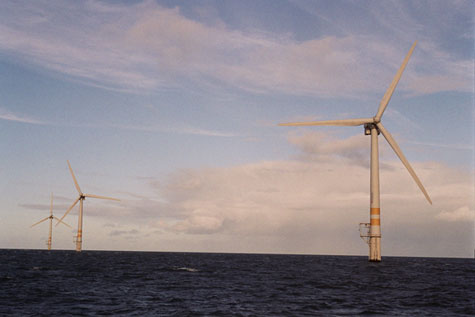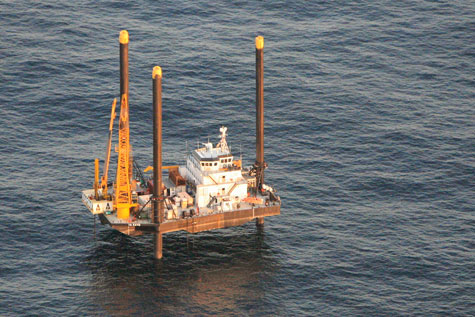
EURO WIND Europeans have take the lead on offshore wind projects, like this array off the coast of Ireland. |
The Rhode Island recession, among the worst in the country, has become something of a national curiosity: how could such a little state be in such big trouble?The Boston Globe has weighed in. The New York Times, too. And in April, Rhody's troubles made international headlines with a snarky little piece in the Economist. There was some finger-wagging about the state's reliance on a rusting manufacturing sector. Talk of a poor tax climate for business.
And amid chatter that the state may have finally hit bottom, this dry assessment from University of Rhode Island economics professor Leonard Lardaro: "We can see the light at the end of the tunnel. Let's hope it's not a train."
The Ocean State has become a study in stagnation. A lesson in the perils of poor economic planning. And in the always-fierce competition for new business and new jobs, reputation matters.
But amid the gloom, there is talk of something shiny and forward-looking and lucrative. A bright rejoinder to the naysayers. Listen closely and you'll hear the refrain from Governor Carcieri on down: Rhode Island is poised to build a Silicon Valley for renewable energy.
At the center of this grand vision is Deepwater Wind, a New Jersey outfit that is planning a small, five-to-eight turbine wind farm just off the coast of Block Island by 2012 and a much larger, 110-turbine array some 15 to 25 miles south of Little Compton by 2014.
The company has agreed in principle to lease 117 acres at Quonset Point for assembly and deployment of the massive latticework towers it envisions for wind farms here and off the coast of New Jersey.
And the hope is that Deepwater's $1.5 billion venture will create a hub for the nation's nascent offshore wind industry: drawing other upstart developers, attracting turbine and blade manufacturers from abroad, serving as a magnet for academics and engineers and entrepreneurs.
Success could mean hundreds of high-paying jobs and a significant slice of a multi-billion-dollar market for ocean-based energy, with first-generation projects expected to dot the coast from Maine to Delaware in the coming years and more in the works further south.
"It's not often that you have a chance to give birth to an industry," said Paul Rich, chief development officer for Deepwater. "And that's what we're doing right now."
Heady talk. But there is reason for optimism. Rhode Island's much-maligned political leadership has positioned the state reasonably well for offshore wind development, by most accounts. A comprehensive mapping of the ocean, designed to identify sites for renewable energy development, has won national attention. And in June, Governor Carcieri signed legislation requiring utility National Grid to negotiate long-term contracts for green energy — providing a potential market for Deepwater and, just as important, a selling point for the firm as it seeks financing for the project.

DRILL, BABY, DRILL A barge drills holes in the sea floor off the coast of Block Island as part of an effort to build a small wind farm there. |
Moreover, after years of dawdling, Washington has sent strong signals in recent months that it is getting serious about offshore wind and other renewable energy. In April, the Obama Administration released long-awaited rules governing federal approval of offshore wind projects. And in June, Interior Secretary Ken Salazar issued leases for exploration of five potential wind farms off the coast of New Jersey and Delaware.Congress, meanwhile, included all sorts of cash and incentives for green power in the stimulus package. And lawmakers are considering legislation that would cap carbon emissions and establish a national renewable energy standard, requiring utilities across the country to provide consumers with a certain amount of alternative energy.
Still, giving birth to an industry is no mean feat. The Deepwater project, for all its promise, is a delicate enterprise. And Rhode Island is hardly alone in the race to create a hub for offshore wind development.
After years of stagnation, the state's great hope for revival will be no easy undertaking.
BEGINNINGS
Just a few months removed from the Bush Administration, it is easy to forget that the United States once led the way on wind power. But it did.
The energy crisis of the '70s spurred state and federal legislation that produced the world's first big commercial wind farms — most famously Altamont Pass, a sprawling development about an hour east of San Francisco that remains among the largest concentrations of turbines on the planet.
But a shift in tax incentives in the Reagan era led to a sharp downturn in wind development. And the industry repaired to the friendlier climes of Europe, where wind farms sprouted like Spring shoots before a land crunch pushed the turbines off the coast of Denmark and the United Kingdom.